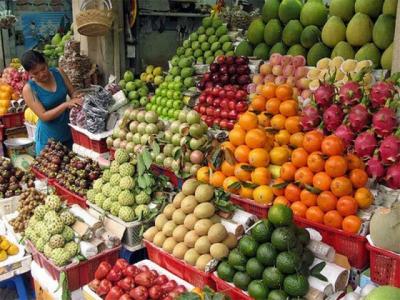Vietnamese prefer Thai and Chinese fruit & vegetables

Vietnamese people spent more than $164 million on fruit and vegetable imports in the first two months of 2017, of which 70 per cent were from Thailand and China, according to figures from the General Department of Customs (GDC).
Import value fell nearly 31 per cent year-on-year. On average, Vietnamese people spend nearly $2.8 million per day on imported fruit and vegetables.
Thailand and China’s 70 per cent market share was equal to $114.2 million.
Thailand is the largest source, with turnover of $82.6 million, or 50 per cent. China saw turnover reach $31.6 million.
Myanmar and the US followed, with $15 million and $13.2 million, respectively.
Most imports were mangos, custard-apples, and tamarind from Thailand and apples, oranges, pears, kiwi fruit, and cherries from New Zealand and Australia, while those from China were mainly cabbage, lettuce, potatoes, oranges, and apples.
According to agricultural experts, the two main reasons why Vietnamese have been attracted to Thai fruit in recent years are the difference in taste and the quality.
Exports, meanwhile, were more than $421,000 in the first two months, up 27 per cent year-on-year.
Major markets were China, Japan, Taiwan, and Canada.
Related news
 Việt Nam, China boost tea and coffee production co-operation
Việt Nam, China boost tea and coffee production co-operation China is a big importer of Vietnamese agricultural products, however, the potential is very large, so it’s necessary to increase the supply of agricultural
 Woman turns barren land into organic farm
Woman turns barren land into organic farm Choosing which seedlings and animals to raise was next, working out the best options to reap rewards and ensure the family’s livelihood as well as the study
 VET conference seeks solutions to boosting rice exports
VET conference seeks solutions to boosting rice exports Export revenue in the first eight months of this year fell due to an imbalance in supply and demand, leading to a decrease in the average export price.
 Dept proposes reducing rice farming areas for upcoming crop
Dept proposes reducing rice farming areas for upcoming crop The area for rice farming in the Mekong Delta and Southeast Việt Nam should be reduced for the upcoming winter-spring rice crop to lessen the negative impact
 Arid lands ranching focus of high-tech project
Arid lands ranching focus of high-tech project New Mexico and Texas researchers seek economical and sustainable arid lands beef management practices.